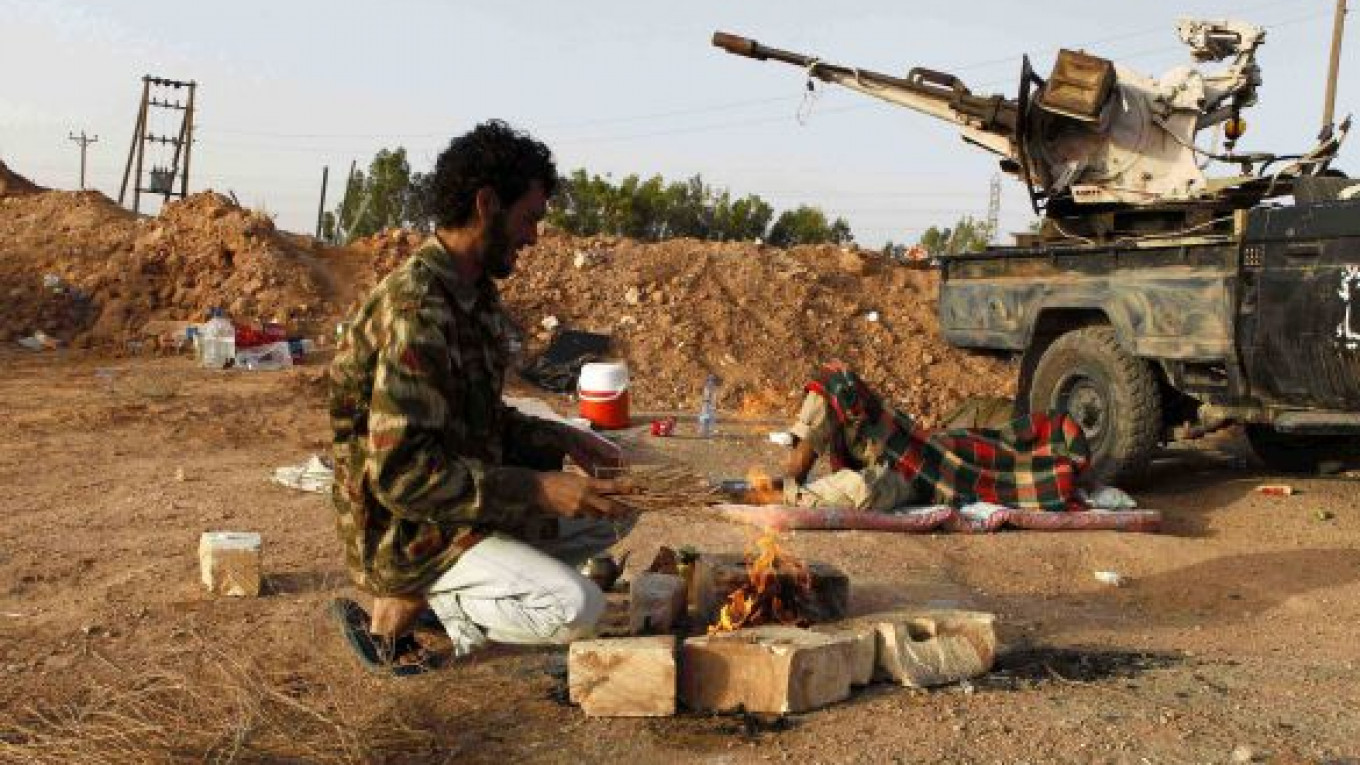TRIPOLI, Libya — Armed rebels detained 19 Ukrainian cooks and oil workers for several days on unsupported claims that they were really snipers for Moammar Gadhafi.
They are among thousands of foreigners caught in a web of suspicion as rebel fighters pursue the remnants of Gadhafi's forces. Gadhafi hired some foreigners as mercenaries, but many others held ordinary jobs in Libya, and the rebels who ousted the Gadhafi regime from most of Tripoli last month often seem to make little effort to tell them apart.
"How can we be snipers?" cook Maxim Shadrov asked angrily at a training center for oil workers in Tripoli where he, his wife and 17 other Ukrainians were being held.
"They are old. She is a woman. We are not snipers," he said, pointing to some members of his group. Even a rebel commander conceded that he had no evidence to the contrary, but held them nonetheless, despite a diplomat's efforts to free them.
There have been widespread arrests and frequent abuse of migrant workers since the rebels seized Tripoli late last month, Human Rights Watch said Sunday, but did not give an estimate of the number of detainees. The group said the clampdown created "a grave sense of fear among the city's African population."
A rebel official estimated that some 5,000 people have been detained since rebels seized Tripoli. At one makeshift detention camp, conditions for Libyan detainees were acceptable, but sub-Saharan Africans were held in overcrowded cells with a putrid stench, Human Rights Watch said. The detainees complained of a lack of water and poor sanitation.
The detentions have created an image problem for the rebel leadership, which relies heavily on Western support and has pledged to build a new Libya based on the rule of law, in contrast to Gadhafi's brutal regime.
Some workers said they had not been harassed by either side in the war. Others, including some of the Ukrainian detainees, planned to stay in Libya despite receiving rough treatment.
"As you know, life in Ukraine is bad," said Shadrov, the cook. "We came here to earn money for our family."
The Ukrainians, hired by the Russian-Libyan oil company Dakara, arrived in Tripoli in July. After the rebels entered the capital on Aug. 21, the Ukrainians were detained by rebel fighters, handcuffed and moved to various locations, Shadrov said.
"They took everything from us," he said. "Money, passports, computers, everything."
Othman bin Othman, the rebel commander in charge of the oil workers' training center, initially said the Ukrainians were armed and trained as snipers, but changed his account after reporters interviewed the detainees.
"To be very honest, we didn't find any weapons in their houses or on them, but they arrived into the country illegally and during a very sensitive time — after the war," he said. "This led us to believe they were working for the enemy."
Diplomats from Russia and Ukraine visited the group, and Shadrov's father, a Russian citizen, was able to leave.
At a meeting with the rebels, the Ukrainian consul was asked to bring back a written promise that if the Ukrainians were allowed to leave the detention center, they would stay in their homes and not leave the country without proper documentation.
A Message from The Moscow Times:
Dear readers,
We are facing unprecedented challenges. Russia's Prosecutor General's Office has designated The Moscow Times as an "undesirable" organization, criminalizing our work and putting our staff at risk of prosecution. This follows our earlier unjust labeling as a "foreign agent."
These actions are direct attempts to silence independent journalism in Russia. The authorities claim our work "discredits the decisions of the Russian leadership." We see things differently: we strive to provide accurate, unbiased reporting on Russia.
We, the journalists of The Moscow Times, refuse to be silenced. But to continue our work, we need your help.
Your support, no matter how small, makes a world of difference. If you can, please support us monthly starting from just $2. It's quick to set up, and every contribution makes a significant impact.
By supporting The Moscow Times, you're defending open, independent journalism in the face of repression. Thank you for standing with us.
Remind me later.






